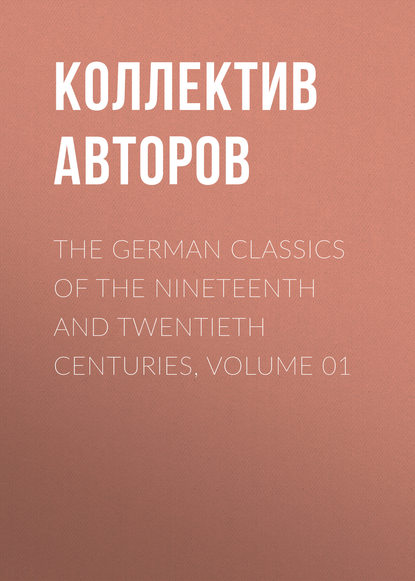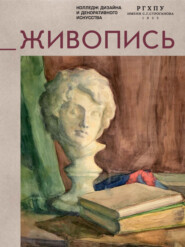По всем вопросам обращайтесь на: info@litportal.ru
(©) 2003-2025.
✖
The German Classics of the Nineteenth and Twentieth Centuries, Volume 01
Настройки чтения
Размер шрифта
Высота строк
Поля
Nature and art asunder seem to fly,
Yet sooner than we think find common ground;
In place of strife, harmonious songs resound,
And both, at one, to my abode draw nigh.
In sooth but one endeavor I descry:
Then only, when in ordered moments' round
Wisdom and toil our lives to Art have bound,
Dare we rejoice in Nature's liberty.
Thus is achievement fashioned everywhere:
Not by ungovernable, hasty zeal
Shalt thou the height of perfect form attain.
Husband thy strength, if great emprize thou dare;
In self-restraint thy masterhood reveal,
And under law thy perfect freedom gain.
COMFORT IN TEARS[19 - Translators: W.E. Aytoun and Theodore Martin.] (1803)
How is it that thou art so sad
When others are so gay?
Thou hast been weeping—nay, thou hast!
Thine eyes the truth betray.
"And if I may not choose but weep
Is not my grief mine own?
No heart was heavier yet for tears—
O leave me, friend, alone!"
Come join this once the merry band,
They call aloud for thee,
And mourn no more for what is lost,
But let the past go free.
"O, little know ye in your mirth,
What wrings my heart so deep!
I have not lost the idol yet,
For which I sigh and weep."
Then rouse thee and take heart! thy blood
Is young and full of fire;
Youth should have hope and might to win,
And wear its best desire.
"O, never may I hope to gain
What dwells from me so far;
It stands as high, it looks as bright,
As yonder burning star."
Why, who would seek to woo the stars
Down from their glorious sphere?
Enough it is to worship them,
When nights are calm and clear.
"Oh, I look up and worship too—
My star it shines by day—
Then let me weep the livelong night
The while it is away."
EPILOGUE TO SCHILLER'S "SONG OF THE BELL"[20 - Translators: W. E. Aytoun and Theodore Martin.]
[This fine piece, written originally in 1805, on Schiller's death, was altered and recast by Goethe in 1815, on the occasion of the performance on the stage of the Song of the Bell. Hence the allusion in the last verse.]
To this city joy reveal it!
Peace as its first signal peal it!
(Song of the Bell—concluding lines).
And so it proved! The nation felt, ere long,
That peaceful signal, and, with blessings fraught,
A new-born joy appeared; in gladsome song
To hail the youthful princely pair we sought;
While in the living, ever-swelling throng
Mingled the crowds from every region brought,
And on the stage, in festal pomp arrayed,
The HOMAGE OF THE ARTS[21 - The title of a lyric piece composed by Schiller in honor of the marriage of the hereditary prince of Weimar to the Princess Maria of Russia, and performed in 1804.] we saw displayed.
When, lo! a fearful midnight sound I hear,
That with a dull and mournful echo rings.
And can it be that of our friend so dear
It tells, to whom each wish so fondly clings?
Shall death o'ercome a life that all revere?
How such a loss to all confusion brings!
How such a parting we must ever rue!
The world is weeping—shall not we weep, too?
He was our own! How social, yet how great
Seemed in the light of day his noble mind!
How was his nature, pleasing yet sedate,
Now for glad converse joyously inclined,
Then swiftly changing, spirit-fraught elate,
Life's plan with deep-felt meaning it designed,
Fruitful alike in counsel and in deed!
This have we proved, this tested, in our need.
He was our own! O may that thought so blest
O'ercome the voice of wailing and of woe!
He might have sought the Lasting, safe at rest
In harbor, when the tempest ceased to blow.
Meanwhile his mighty spirit onward pressed
Where goodness, beauty, truth, forever grow;
And in his rear, in shadowy outline, lay
Yet sooner than we think find common ground;
In place of strife, harmonious songs resound,
And both, at one, to my abode draw nigh.
In sooth but one endeavor I descry:
Then only, when in ordered moments' round
Wisdom and toil our lives to Art have bound,
Dare we rejoice in Nature's liberty.
Thus is achievement fashioned everywhere:
Not by ungovernable, hasty zeal
Shalt thou the height of perfect form attain.
Husband thy strength, if great emprize thou dare;
In self-restraint thy masterhood reveal,
And under law thy perfect freedom gain.
COMFORT IN TEARS[19 - Translators: W.E. Aytoun and Theodore Martin.] (1803)
How is it that thou art so sad
When others are so gay?
Thou hast been weeping—nay, thou hast!
Thine eyes the truth betray.
"And if I may not choose but weep
Is not my grief mine own?
No heart was heavier yet for tears—
O leave me, friend, alone!"
Come join this once the merry band,
They call aloud for thee,
And mourn no more for what is lost,
But let the past go free.
"O, little know ye in your mirth,
What wrings my heart so deep!
I have not lost the idol yet,
For which I sigh and weep."
Then rouse thee and take heart! thy blood
Is young and full of fire;
Youth should have hope and might to win,
And wear its best desire.
"O, never may I hope to gain
What dwells from me so far;
It stands as high, it looks as bright,
As yonder burning star."
Why, who would seek to woo the stars
Down from their glorious sphere?
Enough it is to worship them,
When nights are calm and clear.
"Oh, I look up and worship too—
My star it shines by day—
Then let me weep the livelong night
The while it is away."
EPILOGUE TO SCHILLER'S "SONG OF THE BELL"[20 - Translators: W. E. Aytoun and Theodore Martin.]
[This fine piece, written originally in 1805, on Schiller's death, was altered and recast by Goethe in 1815, on the occasion of the performance on the stage of the Song of the Bell. Hence the allusion in the last verse.]
To this city joy reveal it!
Peace as its first signal peal it!
(Song of the Bell—concluding lines).
And so it proved! The nation felt, ere long,
That peaceful signal, and, with blessings fraught,
A new-born joy appeared; in gladsome song
To hail the youthful princely pair we sought;
While in the living, ever-swelling throng
Mingled the crowds from every region brought,
And on the stage, in festal pomp arrayed,
The HOMAGE OF THE ARTS[21 - The title of a lyric piece composed by Schiller in honor of the marriage of the hereditary prince of Weimar to the Princess Maria of Russia, and performed in 1804.] we saw displayed.
When, lo! a fearful midnight sound I hear,
That with a dull and mournful echo rings.
And can it be that of our friend so dear
It tells, to whom each wish so fondly clings?
Shall death o'ercome a life that all revere?
How such a loss to all confusion brings!
How such a parting we must ever rue!
The world is weeping—shall not we weep, too?
He was our own! How social, yet how great
Seemed in the light of day his noble mind!
How was his nature, pleasing yet sedate,
Now for glad converse joyously inclined,
Then swiftly changing, spirit-fraught elate,
Life's plan with deep-felt meaning it designed,
Fruitful alike in counsel and in deed!
This have we proved, this tested, in our need.
He was our own! O may that thought so blest
O'ercome the voice of wailing and of woe!
He might have sought the Lasting, safe at rest
In harbor, when the tempest ceased to blow.
Meanwhile his mighty spirit onward pressed
Where goodness, beauty, truth, forever grow;
And in his rear, in shadowy outline, lay
Другие электронные книги автора Коллектив авторов
Живопись




 0
0

















